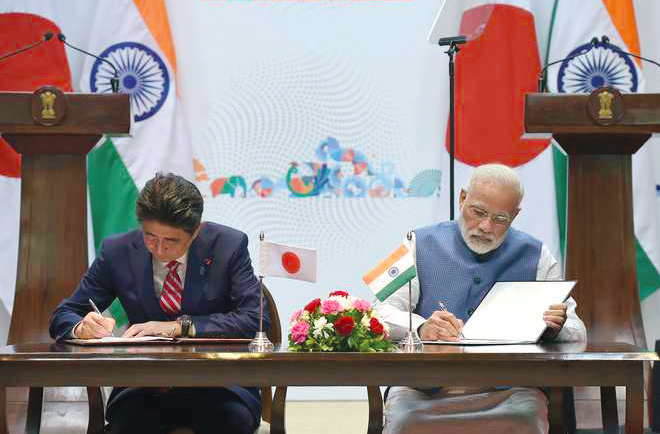GANDHINAGAR (TIP): Deepening their strategic ties further, India and Japan on September 14 agreed to boost cooperation in the Indo-Pacific region in the midst of China’s growing assertiveness and pitched for a “zero tolerance” in combating terrorism, including towards Pakistan-based groups JeM and LeT.
The two countries signed 15 deals in key areas, including civil aviation, trade after wide-ranging talks between Prime Minister Narendra Modi and his Japanese counterpart Shinzo Abe as they discussed ways to strengthen cooperation in strategic areas of defence, security, trade and civil nuclear energy.
The two leaders also deliberated upon important regional and global issues and affirmed strong commitment to their values-based partnership in achieving a free, open and prosperous Indo-Pacific region where sovereignty and international law are respected, and differences are resolved through dialogue, and where all countries, large or small, enjoy freedom of navigation and overflight.
But significantly, the joint statement issued after their talks did not mention South China Sea directly unlike last year’s joint statement.
After the 2016 summit during Modi’s visit to Japan, the joint statement had said, “regarding the South China Sea, the two Prime Ministers stressed the importance of resolving the disputes by peaceful means, in accordance with universally recognised principles of international law including the UNCLOS.”
Addressing a joint press event with Abe, Modi said, “the range of special strategic and global partnership is not just limited to bilateral and regional sphere. We have close cooperation on global issues as well.”
In an apparent message to Pakistan, the two sides also called upon all countries to work towards rooting out terrorist safe havens and infrastructure, disrupting terrorist networks and financing channels and halting cross-border movement of terrorists.
The two prime ministers also called for Pakistan to bring to justice the perpetrators of terrorist attacks including those involved in Mumbai (2008) and the Pathankot (2016) strikes.
“They looked forward to the convening of the fifth India-Japan Consultation on Terrorism and to strengthening cooperation against terrorist threats from groups including Al-Qaida, ISIS, Jaish-e- Mohammad (JeM), Lakshar-e-Taiba (LeT), and their affiliates,” said a joint statement issued after the Modi-Abe talks.
It said Modi and Abe condemned in the “strongest terms” the growing menace of terrorism and violent extremism and shared the view that terrorism in all its forms and manifestations is a global scourge that must be forcefully combated through concerted global action in the spirit of “zero tolerance”.
“Accordingly, the two Prime Ministers called upon all UN member countries to implement the UNSC Resolution 1267 and other relevant resolutions designating terrorist entities,” said the joint statement.
The reference also assume significance in the backdrop of China repeatedly blocking India’s move to declared JeM chief Masood Azhar as global terrorist by the UN.
On his part, Abe said, “we have just signed a joint statement which will serve as a milestone to open a new era for Japan- India relationship… based on that we will strongly promote Japan-India special strategic and global partnership to drive peace and prosperity for Indo-Pacific region and the whole world.”
Modi and Abe underlined that the two countries could play a central role in safeguarding and strengthening a rules based order in the Indo-Pacific and to this end, they pledged to reinforce their efforts to enhance defence and security cooperation and dialogues, including the MALABAR and other joint exercises, the statement said.
During his press statement, Abe also referred to the recent Malabar Japan- India-US naval exercise and said cooperation would be further strengthened.
Source: PTI
